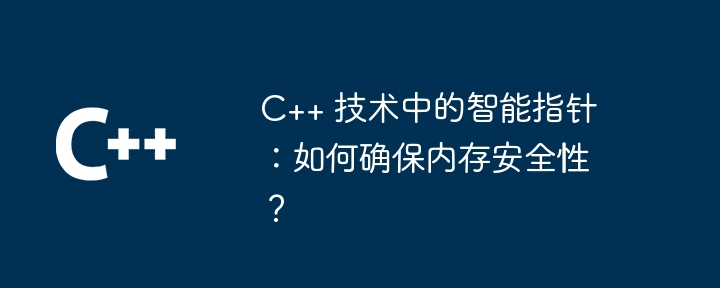
Abstract: Smart pointers are objects used in C to manage memory resources, providing automatic memory release, reference counting and ownership semantics to ensure memory safety. Practical smart pointer types: unique_ptr: unique ownership, only one pointer points to the resource, and the memory is released when destroyed. shared_ptr: Shared ownership, multiple pointers point to the same resource, and the memory is released when the last pointer is destroyed. weak_ptr: Indirect access to resources, does not increase the reference count, and does not prevent the resource from being released. When to use smart pointers: Managing dynamically allocated memory. Prevent memory leaks. Handles multi-threaded memory access.

Smart pointers in C technology: the key to ensuring memory safety
Introduction
When programming in C, managing memory resources is critical to writing safe and reliable code. If memory is not managed correctly, applications can experience crashes, memory leaks, and data corruption. Smart pointers are a powerful tool in C that can help eliminate these risks and ensure memory safety.
What is a smart pointer?
A smart pointer is an object that wraps a raw pointer and provides some additional features, such as:
Practical smart pointer types
The C standard library provides several commonly used smart pointer types:
Practical case
To demonstrate the use of smart pointers, let us write a program that manages a character array:
#include <iostream>
#include <memory>
int main() {
// 使用 unique_ptr管理字符数组
std::unique_ptr<char[]> array(new char[5]);
std::strcpy(array.get(), "Hello");
// 使用 array 指针访问数组
std::cout << array.get() << std::endl;
return 0;
}In this example , we use unique_ptr to manage the character array array. When the main function returns, unique_ptr will be destroyed and the memory allocated by new will be automatically released. This ensures that memory is not leaked.
When to use smart pointers?
Smart pointers are useful in the following situations:
new. Conclusion
Smart pointers are an important tool in C to ensure memory safety and prevent memory-related errors. By using unique_ptr, shared_ptr, and weak_ptr, you can simplify memory management and write more stable and reliable code.
The above is the detailed content of Smart pointers in C++ technology: How to ensure memory safety?. For more information, please follow other related articles on the PHP Chinese website!
 What are the differences between c++ and c language
What are the differences between c++ and c language
 Recommended learning order for c++ and python
Recommended learning order for c++ and python
 Cost-effectiveness analysis of learning python and c++
Cost-effectiveness analysis of learning python and c++
 Is c language the same as c++?
Is c language the same as c++?
 Which is better to learn first, c language or c++?
Which is better to learn first, c language or c++?
 The difference and connection between c language and c++
The difference and connection between c language and c++
 C++ software Chinese change tutorial
C++ software Chinese change tutorial
 Cost-effectiveness analysis of learning python, java and c++
Cost-effectiveness analysis of learning python, java and c++




